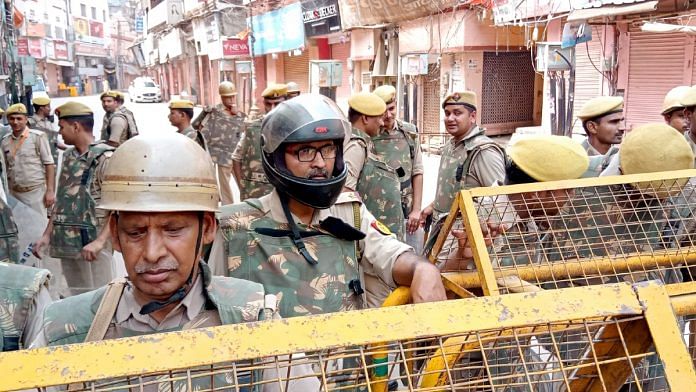New Delhi: The Supreme Court Tuesday directed the Varanasi district magistrate to protect the area where a Shivling (a symbol of the Hindu god Shiva) is believed to have been found during a survey of the Gyanvapi mosque premises in Varanasi. However, the court cautioned that measures taken to do so must not hinder Muslims from offering prayers at the site.
The apex court’s order came a day after a Varanasi civil court directed the district administration to seal off the area within the mosque complex where the Shivling had reportedly been discovered.
The SC’s directions followed an appeal filed by the Anjuman Intezamia Masjid Committee, which manages the Gyanvapi mosque, challenging the Allahabad High Court’s 21 April order that allowed a survey of the mosque in accordance with the Varanasi court’s order.
The SC bench of justices D.Y. Chandrachud and P.S. Narasimha also declined to stay the proceedings pending in the Varanasi court that is hearing the Kashi Vishwanath-Gyanvapi dispute matter.
The plaintiffs in the Kashi Vishwanath-Gyanvapi Mosque complex dispute have sought permission for regular worship at ‘Maa Shringar Gauri Sthal’, where idols of the goddess and other Hindu deities are situated. They claim it is located on the outer wall of the Gyanvapi mosque, and it was on their plea that the civil court had ordered the survey.
The SC will next hear the matter on 19 May.
Also Read: Congress backs Places of Worship Act amid Gyanvapi row, in bid to do ‘what Gandhi would do’
What was the hurry, mosque’s counsel asks
The Intezamia committee had moved the Allahabad High Court last month questioning three orders of the Varanasi trial court — dated 18 August, 2021, 5 April, 2022, and 8 April, 2022 — all of which pertained to the survey and the appointment of a commissioner to lead the team that conducted it.
On yet another application by the plaintiffs, the trial court Monday ordered the sealing of a portion of the mosque where according to the plaintiffs, a Shivling had been found in a wazukhana, a place where devotees wash their hands, feet and face before heading to the designated area for prayers. The court passed the order without waiting for the commissioner’s report on the survey, which had concluded Monday.
Appearing for the mosque committee, senior advocate Huzefa Ahamdi questioned the trial court’s 16 May order, especially the court’s quickness to order the sealing of the premises.
Ahmadi sought a stay of all the trial court orders on grounds of serious reservations regarding procedural fairness in the matter. “We do not even know what the report is (by the commissioner). This order (of 16 May) is on the plaintiff’s application,” he contended before the bench.
Ahmadi said that by allowing the plaintiff’s application, the Varanasi court had restricted the entry of Muslims inside the mosque to 20, prohibited them from using the wazukhana, and thus changed the character of the shrine.
Such a direction, he argued, was illegal because it went against the Places of Worship Act, 1991, which, he added, received approval from the Supreme Court when it had decided the Ram Janmabhoomi-Babri Masjid land dispute matter.
After hearing the matter for more than 40 minutes, the bench indicated broadly what it intended to order. However, Solicitor General Tushar Mehta, who appeared for the Uttar Pradesh government, which is also a party in the case, urged the court to adjourn the hearing by a day so he can revert with factual instructions.
“We do not know the geographical areas of the temple. From what I have learnt, after reading news reports, the Shivling has been found inside the wazukhana. The concern of the magistrate (in sealing the premises) is that something seems to have been found, which is of great significance for deciding the suit, which should not be damaged if anyone enters the wazukhana,” Mehta told the bench.
However, the bench was of the view that even though the magistrate had in his order only specified about sealing the premises where the Shivling is believed to have been found, the effect of his 16 May direction to allow the application meant it accepted the other prayers also, which included restricting the number of Muslims who could enter the mosque and prohibiting the use of the wazukhana.
It was then that the bench once again indicated its order, prompting Mehta to reiterate his earlier plea for time to understand the potential ramifications.
The court, however, declined the request and said it will hear the matter on 19 May and issued notice to the opposite side — the plaintiffs before the Varanasi civil court. Till then, it ordered the district magistrate to ensure that the area where Shivling was allegedly found is protected and that there is no restriction on the number of Muslims who want to access the mosque to offer namaz.
‘Order must not be construed as impeding right to offer namaz’
Ahmadi asked the bench to clarify whether the wazukhana would also be permitted for use. The court then said that the protection granted to secure the area where the Shivling was allegedly found shall not be construed as impeding the right to offer namaz and religious observances, which includes use of the wazukhana.
When Ahmadi insisted for a stay on the proceedings, Justice Chandrachud observed, “The learned trial judge is aware that we are hearing the matter.”
Ahmadi however said that the trial court went ahead to pass the order of sealing even though the top court had fixed the mosque committee’s appeal for a hearing Tuesday. When Mehta took objection to this statement, the bench advised both to “leave” the issue for the day.
(Edited by Gitanjali Das)
Also Read: Plea to worship Hindu idols, survey row — the latest Kashi Vishwanath-Gyanvapi legal tussle



